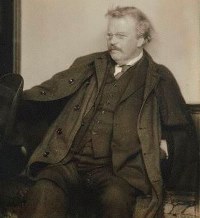Chesterton the Apologist
When we think of Chesterton today, we think of Father Brown, the quintessential priest-detective. But, like Conan Doyle, who believed his more serious writings were more important than his Sherlock Holmes stories, Chesterton’s central thrust (even in the persona of Father Brown) was elsewhere. At heart, Chesterton was a controversalist, or, better, an apologist. What he really wanted to achieve was to bring his contemporaries (and us!) back to sanity by showing the truth of classic Christian orthodoxy.
True, he seems to discount his apologetic role. In one of his most important books, Orthodoxy, he claims that he is doing spiritual autobiography, not apologetics. He goes so far as to declare: “I never read a line of Christian apologetics.” But in effect this put him in the same category of originality as Wittgenstein, who refused to read traditional philosophy and thereby created something truly original himself.
The sages have a hundred maps to give
That trace their crawling cosmos like a tree,
They rattle reason out through many a sieve
That stores the sand and lets the gold go free:
And all these things are less than dust to me
Because my name is Lazarus and I live.
- G.K. Chesterton (1922)
Chesterton’s Apologetic Impact
The proof of the pudding in Chesterton’s case is the influence he has had on contemporary and subsequent defenders of the faith.  Etienne Gilson, the great medievalist, said that Orthodoxy was the best apologetic the 20th century had yet produced. When Chesterton died, Charles Williams of the Oxford Inklings lamented, “The last of my Lords is dead.” In his obituary for Chesterton, T.S. Eliot stated flatly that Chesterton “did more than any man of his time” to “maintain the existence of the [Christian] minority in the modern world.”
Etienne Gilson, the great medievalist, said that Orthodoxy was the best apologetic the 20th century had yet produced. When Chesterton died, Charles Williams of the Oxford Inklings lamented, “The last of my Lords is dead.” In his obituary for Chesterton, T.S. Eliot stated flatly that Chesterton “did more than any man of his time” to “maintain the existence of the [Christian] minority in the modern world.”
Chesterton’s impact on C.S. Lewis and J.R.R. Tolkien was immense. When Lewis asserts concerning the gospel story that “here and here only in all time the myth must become fact; the Word, flesh; God, Man,” and Tolkien declares, “this story is supreme; and it is true. Art has been verified. Legend and history have met and fused,” they are echoing Chesterton:
In answer to the historical query of why it was accepted, and is accepted, I answer for millions of others in my reply: because it fits the lock; because it is like life. It is one among many stories; only it happens to be a true story. It is one among many philosophies; only it happens to be the truth.
And when C.S. Lewis, in the final volume of the Narnian Chronicles, has the children find in Narnia companions they thought they would never see again and learn that in God’s kingdom “no good thing is ever lost,” he picks up from where Chesterton left off:
Paradise is somewhere and not anywhere, is something and not anything. And I would not be so very much surprised if the house in heaven had a real green lamp-post after all.
Chesterton’s Attack on Enemy Territory
Chesterton’s influence apologetically was—and is—due to his special approach to the defence of the faith. Several elements come together to produce a unique apologetic style.
First, though the word 'apologetics' means literally 'defence,' Chesterton was never defensive. As one commentator put it, he “wrestled the initiative from the skeptics and presented the historic faith upon a note of triumphant challenge.”
“We don’t know enough about the unknown to know that it is unknowable.”
- G.K. Chesterton
Thus, Chesterton goes after the fallacious and irrational presuppositions of unbelief, showing, often by way of epigrammatic gems, that the self-styled rationalist is as naked as Hans Christian Andersen’s emperor in the tale of The Emperor’s Clothes. An example or two will show Chesterton’s withering logic.
He observes that “the man who denies original sin believes in the Immaculate Conception of everybody.”
Over against the argument that we must remain agnostic and never claim that God has in fact revealed himself in this world: “We don’t know enough about the unknown to know that it is unknowable.”
To those who think Evolution eliminates God’s creative activity: “It is absurd for the Evolutionist to complain that it is unthinkable for an admittedly unthinkable God to make everything out of nothing, and then pretend that it is more thinkable that nothing should turn itself into everything.”
Chesterton never tires in pointing out the unjustified and unrecognised dogmatism of the unbeliever—in contrast with the open and attractive worldview of the orthodox Christian:
The Christian is quite free to believe that there is a considerable amount of settled order and inevitable development in the universe. But the materialist is not allowed to admit into his spotless machine the slightest speck of spiritualism or miracle.
Chesterton’s Concern with Facts
In today’s apologetic climate, there are two major schools of thought: the Presuppositionalists (who hold that because of sin, the unbeliever always starts from his or her presuppositions of unbelief, and that only by starting from the true presupposition of Christian truth can one achieve anything) and the Evidentialists (who argue that we can and must convince the unbeliever of revelational truth by presenting the factual evidence for Christian verities).
Chesterton would certainly have joined the Evidentialist camp.
True, he was concerned with the unbeliever’s presuppositions—but only to demonstrate the fallacious nature of them. He did not think that believers and unbelievers operate, as it were, in hermetically sealed philosophical compartments. His apologetic echoes St Paul’s concern to become “a Jew to the Jew and a Greek to the Greeks”—”all things to all persons, that by all means some might be saved.”
Note how Chesterton defends the miracles of the New Testament which constitute the central evidence for the Deity of our Lord:
Somehow or other an extraordinary idea has arisen that the disbelievers in miracles consider them coldly and fairly, while believers in miracles accept them only in connection with some dogma. The fact is quite the other way. The believers in miracles accept them (rightly or wrongly) because they have evidence for them. The disbelievers in miracles deny them (rightly or wrongly) because they have a doctrine against them.
It is unbelieving dogmatism which keeps a fallen race from the gospel, not an absence of factual evidence for it.
Chesterton’s point—here and in general—is that the facts are on the side of Christian orthodoxy. If one is willing to investigate those facts, the truth of the faith will become plain. It is unbelieving dogmatism which keeps a fallen race from the gospel, not an absence of factual evidence for it.
Ronald Knox, the great translator of the New Testament, noted this essential characteristic of Chesterton’s apologetic as it is reflected in the methods of Father Brown:
The real secret of Father Brown is that there is nothing of the mystic about him. When he falls into a reverie—I had almost said, a brown study—the other people in the story think that he must be having an ecstasy, because he is a Catholic priest, and will proceed to solve the mystery by some kind of heaven-sent intuition. And the reader, if he is not careful, will get carried away by the same miscalculation.... And all the time Father Brown is doing just what Poirot does; he is using his little grey cells. He is noticing something which the reader hasn't noticed, and will kick himself later for not having noticed.
Chesterton’s Genuineness
It has been frequently said that “one’s life speaks so loudly that it is difficult to hear what one is saying.” In the case of some apologists for Christian faith, their lives have been so unattractive that their arguments have not been taken seriously.
In evangelical circles, the problem has often been one of sanctimonious pietism. The spokesperson for the gospel has been so legalistic and negative that the lifestyle represented has repelled the unbeliever. For example, by “majoring in minors” and insisting on “blue-laws,” the evangelical has given the impression that to become a Christian one must first of all give up all alcohol, tobacco, theatre, etc. When faced with this personal and ecclesiastical style, the unbeliever has not infrequently found it difficult to listen to what may well constitute sound apologetic arguments for the faith.
Chesterton never fell into this trap. He had a strong doctrine of Creation and saw the beauties and pleasures of this world as gifts of God. A strong aspect of his apologetic was his criticism of pietistic legalism. He devoted, for example, an entire novel to the absurdities of Prohibition (the notion that by removing alcohol from a society one somehow makes the society more moral or more religious). In The Flying Inn, Chesterton supposes that a Muslim prime minister is elected in England and that all Inns and Pubs are abolished as a consequence (creating a situation paralleling Prohibition in the America of the 1920s). Then the same evils arise as on the other side of the water: bureaucracy, crime, and the general increase—not decrease—of social problems. The happy-go-lucky creators of a “flying Inn,” which moves from place to place just ahead of the authorities bent on stamping it out, display the kind of relaxed openness which characterises believers confident in the world in which God has placed them.
Chesterton himself enjoyed fine cuisine and wines. He dressed idiosyncratically and sometimes eccentrically. He understood the scriptural emphasis on the unique importance of each individual before God and hated all bureaucratic and totalitarian attempts at enforced conformity. He was the polar opposite of the Pharisee; and there is little doubt that his transparent genuineness served as a vital reinforcement for the persuasiveness of his formal apologetic arguments.
Chesterton’s Continuing Relevance Today
Fine apologists such as Dorothy Sayers do not always hold the interest of the present generation owing to the time-bound nature of their creative writing (one thinks of her Lord Peter Wimsey detective stories). Does Chesterton suffer from this problem?
Chesterton continues to speak with the clearest of voices, and we do well to listen closely to what he says
To be sure, no one writes in a cultural vacuum, and Chesterton, as a professional journalist, produced much ephemera which have little interest today except for scholars of his work. But the apologetic value of his contributions remains unassailable.
One of the major reasons for this is the resurfacing of theological liberalism. Many thought that two World Wars would put paid to the modernist target of much of Chesterton’s apologetic salvoes. But Karl Barth’s Neo-Orthodox corrective to the old liberalism, while trying to oust one theological devil, nonetheless—by refusing to critique modernism’s acceptance of radical biblical criticism—opened the doors to a number of other demons: Bultmannian existentialism and demythologising; Tillich’s ontological reductionism; process theologies denying God’s transcendence; and, finally, the death-of-God movement.
Now the pendulum has swung back to very much the kind of theological liberalism which Chesterton opposed with such force and effectiveness. The 'Jesus Seminar' and Bishop Shelby Spong seem to be Harry Emerson Fosdick and Bishop James Pike redivivus; and all of them, in their rationalistic refusal to take the Gospel records seriously, their presuppositionalist denial of the miraculous, and their opposition to reliable biblical revelation, place themselves directly in the sights of Chesterton’s heavy artillery.
To all such deviations from classical Christian orthodoxy, Chesterton continues to speak with the clearest of voices, and we do well to listen closely to what he says:
On the third day the friends of Christ coming at daybreak to the place found the grave empty and the stone rolled away. In varying ways they realised the new wonder; but even they hardly realised that the world had died in the night. What they were looking at was the first day of a new creation, with a new heaven and a new earth; and in a semblance of the gardener God walked again in the garden, in the cool not of the evening but the dawn.

For information on the Annual European Summer Study Sessions of the International Academy of Apologetics, Evangelism and Human Rights, Strasbourg, visit www.apologeticsacademy.eu.



